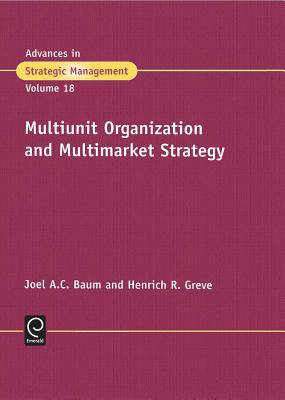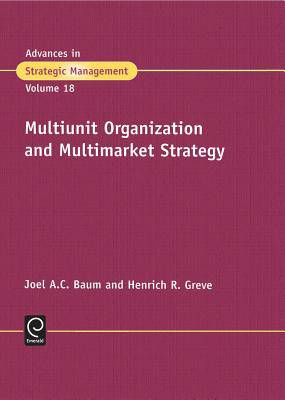
Door een staking bij bpost kan je online bestelling op dit moment iets langer onderweg zijn dan voorzien. Dringend iets nodig? Onze winkels ontvangen jou met open armen!
- Afhalen na 1 uur in een winkel met voorraad
- Gratis thuislevering in België vanaf € 30
- Ruim aanbod met 7 miljoen producten
Door een staking bij bpost kan je online bestelling op dit moment iets langer onderweg zijn dan voorzien. Dringend iets nodig? Onze winkels ontvangen jou met open armen!
- Afhalen na 1 uur in een winkel met voorraad
- Gratis thuislevering in België vanaf € 30
- Ruim aanbod met 7 miljoen producten
Zoeken
Multiunit Organization and Multimarket Strategy
€ 140,95
+ 281 punten
Omschrijving
A conspicuous feature of the modern economy is the multitude of multiunit systems that operate in several markets - an organizational form that arguably rivals the "M-form" as the 20th century's most successful. Research traditions studying multiunit systems include the multimarket perspective, which has used commitment and mutual forbearance theory, and the multiunit perspective, which has used learning and knowledge transfer theory. These perspectives are interdisciplinary, but to date there has been little direct interaction among them. This text aims to bring these areas together, discussing such things as: examining how variation in firm capabilities affects the co-ordination of branches and thus their forbearance or transfer of routines; bridging theories of market conduct and internal behaviour to explore how knowledge about markets and competitor behaviour is transferred among organizational units; making a theory of contingent multiunit or single-unit competitive advantage that can account for the coexistence of these organizational forms in many markets; and examining the effects of firm contacts in alliances or technological fields on their competitive behaviours.
Specificaties
Betrokkenen
- Uitgeverij:
Inhoud
- Aantal bladzijden:
- 420
- Taal:
- Engels
- Reeks:
- Reeksnummer:
- nr. 18
Eigenschappen
- Productcode (EAN):
- 9780762307210
- Verschijningsdatum:
- 15/06/2001
- Uitvoering:
- Hardcover
- Formaat:
- Genaaid
- Afmetingen:
- 164 mm x 240 mm
- Gewicht:
- 839 g

Alleen bij Standaard Boekhandel
+ 281 punten op je klantenkaart van Standaard Boekhandel
Beoordelingen
We publiceren alleen reviews die voldoen aan de voorwaarden voor reviews. Bekijk onze voorwaarden voor reviews.










